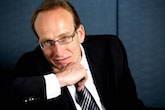Dr. Georg Northoff is a philosopher, neuroscientist and psychiatrist, holding degrees in all three disciplines. Being originally from Germany, he is now working in Ottawa/Canada where he researches the relationship between the brain and mind in its various facets focusing on the neural and biochemical mechanisms related to higher-order mental functions like consciousness and self in both healthy subjects and psychiatric disorders like depression and schizophrenia. “The question driving me is: why and how can our brain construct subjective phenomena like self, consciousness, emotions.” He is one of the leading figures in linking philosophy and neuroscience in a non-reductive way and author of 260 journal articles, 15 books including “Neuro-philosophy and the Healthy Mind” 2016 Norton Publishing, New York.
Get A 10% discount on all courses below PLUS ANY COURSES OR PRIVATE PRACTICE MATERIALS (WHETHER BY ME OR NOT) offered through the Zur Institute using the discount code: DRDAVE88
Check out the following Psychology CE Courses based on listening to Shrink Rap Radio interviews, offered through Zur Institute:
Jungian Psychotherapy Part 1 (6 CEUs)
Jungian Psychotherapy Part 2 (7 CEUs)
Jungian Psychotherapy Part 3 (7 CEUs)
Jungian Psychotherapy Part 4 (6 CEUs)
Jungian Psychotherapy Part 5 (7 CEUs)
Jungian Psychotherapy Package of the Five Above (33 CEUs)
Wisdom of The Dream (4 CEUs)
Positive Psychology (6 CEUs)
Pros and Cons of Positive Psychology (5 CEUs)
The Fundamentals of Positive Psychology (7 CEUs)
CERTIFICATE PROGRAM IN POSITIVE PSYCHOLOGY (39 CEUs)
Body-Mind: Goodbye to Dualism (6 CEUs)
Brain: Insights from Neuroscience (8 CEUs)
Meditation & Psychotherapy (8 CEUs)
Crisis & Trauma: Identification, Assessment, & Treatment (15 CEUs)
Neuroscience and Healing (8 CEUs)
NEW! Holistic & Nutritional Approaches to Treating Psychological Disorders (5 CEUs)
NEW! Holistic Psychotherapy: Treating The Whole Person (6 CEUs)
or check out the
NEW! Complementary and Alternative Medicine Certificate Course (43 CEUs)
NEW! Ego States Psychotherapy: Engaging the Personality’s Different Parts in Psychotherapy (5 CEUs)
ATTENTION! Get A 10% discount on all courses above PLUS ANY COURSES OR PRIVATE PRACTICE MATERIALS (WHETHER BY ME ME OR NOT) offered through the Zur Institute using the discount code: DRDAVE88
Get our iPhone/Android app!
Get 10% discount on all lectures at The JungPlatform using our discount code: DRDAVE
You can also earn CEU’s by going to another partner website at Ed4Online!
A psychology podcast by David Van Nuys, Ph.D.
copyright 2016: David Van Nuys, Ph.D.
Podcast: Play in new window | Download
Subscribe: Apple Podcasts | RSS

Hi David,
That was a fascinating one, thanks! I’m sorry though that you chose breadth over depth as many of the things you touched on really raised my interest and had me want you to ask follow-up questions—but instead you let him of the hook and moved on to the next topic :/
For example:
• Ketamine to treat depression? This is a POWERFUL psychedelic, one of the strongest around. Stan Grof has written extensively about it; I’ve never tried it. I would have loved to hear your guest’s comments on this aspect. What if it’s the psychedelic journey that cures the depression? Did your son experience anything unusual when being administered this drug?
• SSRIs to blunt serotonin? There must have been some kind of misconception here. I do know that the correlation between mood and brain serotonin levels is weak and that both depressed and happy people can be all over the board. But is he really saying upfront that depression always is associated with elevated 5-HT? And that SSRIs blunt serotonin? Especially the latter sounds highly unlikely to me.
• The default mode. This was intriguing, and it had me wonder a lot about its practical implications. How does ”default mode” translate into normal psychological terminology? I’m not sure how to put it into context. Also, can one refine one’s default mode by, for example, meditation practice? Or, contrarily, ruin it by, say, having repeated traumatic experiences? Maybe this even gets to the heart of PTSD?
Lots of questions. Great talk. Maybe I’ll just have to read the book 🙂